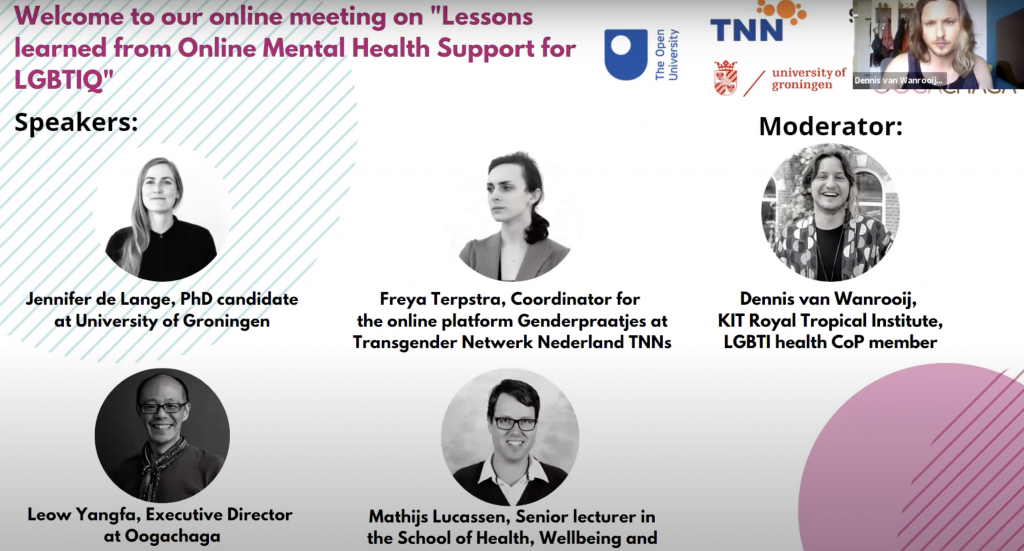Online mental health counselling for LGBTIQ+
On the 21st of September 2021, Dennis van Wanrooij (KIT Royal Tropical Institute, LGBTI health CoP member) moderated a live-interview about online mental health counselling for LGBTIQ+ people with Leow Yangfa (Executive Director at Oogachaga), Jennifer de Lange (PhD candidate at University of Groningen), Mathijs Lucassen (Senior lecturer in the School of Health, Wellbeing and Social Care at the Open University) and Freya Terpstra (Coordinator for the online platform Genderpraatjes at Transgender Netwerk Nederland TNN).
This event was organised by the Share-Net Netherlands’ Community of Practice (CoP) on LGBTI health who aims to improve the health and rights of LGBTI people and communities by strengthening the knowledge and capacities of professionals. One of the activities to achieve this goal in 2021 was through this thematic meeting on Lessons learned from online mental health support for LGBTIQ initiated by Lingga Tri Utama (ResultsinHealth, LGBTI health CoP member) after his involvement with the CoP’s last year’s virtual meeting on mental health and LGBTI.
The high prevalence of mental disorders has posed a challenge around the globe. However, many people with mental health concerns continue to encounter many barriers to accessing care with less than half of them receiving treatment (Whaibeh, 2019; Alonso et al., 2007). This situation is even more challenging for LGBTIQ individuals, who experience higher rates of some mental health concerns due to widespread violence, societal stigma and criminalising contexts, among others. LGBTIQ individuals are more likely to report barriers, at the individual level, clinician level, and systemic level, to mental health services access (Ferlatte et al., 2019).
Online support and services have been seen by mental health care providers as an option that can help overcome the barriers faced by LGBTIQ individuals in accessing mental health services, especially LGBTIQ youth who are often driven online to look for a supportive, validating community and relevant, accurate information (Steinke et al., 2016). Internet is identified as a valuable resource for LGBTIQ youth, especially those who had limited access to other supports (Wilson & Cariola, 2019). For years, LGBTIQ community-based organizations (CBOs) have been using hotline, email and messaging platforms to reach their communities and to provide psychological support for those who need.
On the basis of the above, it was thus important to further explore how these online mental health support and services have been provided, what are the advantages and the challenges of the services provided by CBOs, and how the services accommodate the different needs within the LGBTI community. Furthermore, the meeting explored the opportunities to adopt the approach in other settings in order to improve the mental health status of LGBTIQ people, especially in the today’s digital era.
Download the full report here to learn more about why online mental health services for LGBTI+ individuals is important, its challenges, and opportunities.

Individual LGBTI health CoP members at Share-Net Netherlands continue to engage and support Master students who aspire to write their thesis in relation to LGBTI health. You can learn more about this opportunity here.
General Information: